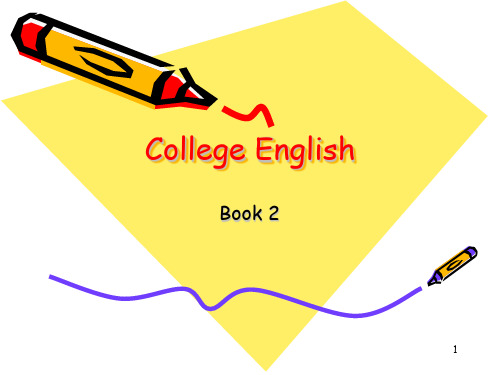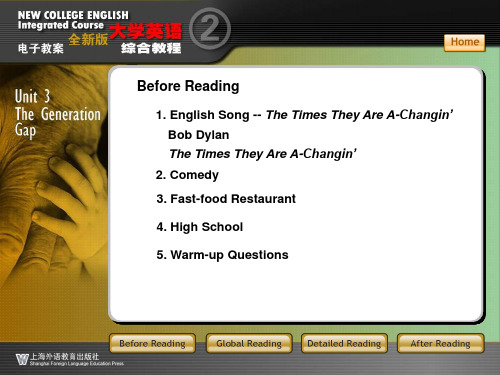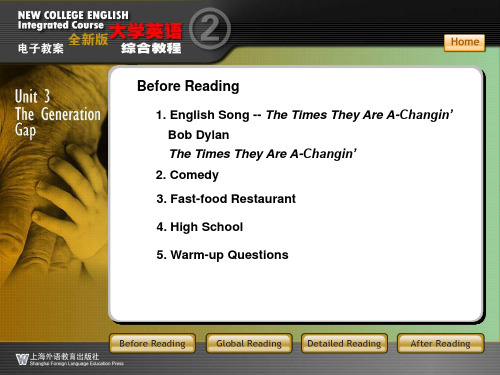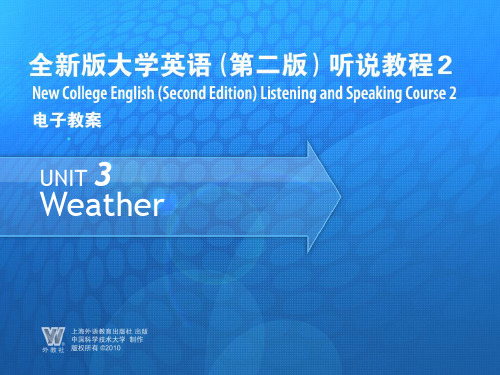大学英语2课件3
合集下载
创E大学英语视听说教程2教学课件Unit 3 Enjoying Movies and Televis

Ⅲ. Making up a Story
My _f_a_v_o_ri_te__(最喜欢的) TV programs are news programs. They contain a large amount of the latest information, covering areas such as politics, economics, culture, sports, science and technology. _B__es_i_d_es__(此外), through such programs I can learn a lot about our country and the world.
Picture 2
1. In the evening, I like to relax and __w_a_t_ch__T_V___ (看电视). 2. What's __o_n__T_V____(播放) tonight? 3. Lucy _tu_r_n_s__o_n_(打开) the TV to watch the evening news. 4. We get the breaking news from the news channel (新闻频道) on TV. 5. _T_a_l_k_s_h_o_w__s__(脱口秀) are as popular as sports games.
Unit 3 Enjoying Movies and Television
创E大学英语视听说教程2 主编:刘莹
01 Warm-up
02 Working on Pictures
contents
03 Listening & Speaking 04 Watching & Speaking
全新版大学英语综合教程第二册ppt课件

*
Benjamin loved to carry the key around, shaking it vigorously. He also liked to try to place it into the slot. Because of his tender age and incomplete understanding of the need to position the key just so, he would usually fail. Benjamin was not bothered in the least. He probably got as much pleasure out of the sounds the key made as he did those few times when the key actually found its way into the slot. Now both Ellen and I were perfectly happy to allow Benjamin to bang the key near the key slot. His exploratory behavior seemed harmless enough. But I soon observed an interesting phenomenon. Any Chinese staff member nearby would come over to watch Benjamin and, noting his lack of initial success, attempt to assist. He or she would hold onto Benjamin's hand and, gently but firmly, guide it directly toward the slot, reposition it as necessary, and help him to insert it. The "teacher" would then smile somewhat expectantly at Ellen or me, as if awaiting a thank you — and on occasion would frown slightly, as if considering us to be neglecting our parental duties. I soon realized that this incident was directly relevant to our assigned tasks in China: to investigate the ways of early childhood education (especially in the arts), and to throw light on Chinese attitudes toward creativity. And so before long I began to introduce the key-slot anecdote into my discussions with Chinesoward Gardner, a professor of education at Harvard University, reflects on a visit to China and gives his thoughts on different approaches to learning in China and the West. LEARNING, CHINESE-STYLE Howard Gardner For a month in the spring of 1987, my wife Ellen and I lived in the bustling eastern Chinese city of Nanjing with our 18-month-old son Benjamin while studying arts education in Chinese kindergartens and elementary schools. But one of the most telling lessons Ellen and I got in the difference between Chinese and American ideas of education came not in the classroom but in the lobby of the Jinling Hotel where we stayed in Nanjing. The key to our room was attached to a large plastic block with the room number on it. When leaving the hotel, a guest was encouraged to turn in the key, either by handing it to an attendant or by dropping it through a slot into a box. Because the key slot was narrow, the key had to be positioned carefully to fit into it.
Benjamin loved to carry the key around, shaking it vigorously. He also liked to try to place it into the slot. Because of his tender age and incomplete understanding of the need to position the key just so, he would usually fail. Benjamin was not bothered in the least. He probably got as much pleasure out of the sounds the key made as he did those few times when the key actually found its way into the slot. Now both Ellen and I were perfectly happy to allow Benjamin to bang the key near the key slot. His exploratory behavior seemed harmless enough. But I soon observed an interesting phenomenon. Any Chinese staff member nearby would come over to watch Benjamin and, noting his lack of initial success, attempt to assist. He or she would hold onto Benjamin's hand and, gently but firmly, guide it directly toward the slot, reposition it as necessary, and help him to insert it. The "teacher" would then smile somewhat expectantly at Ellen or me, as if awaiting a thank you — and on occasion would frown slightly, as if considering us to be neglecting our parental duties. I soon realized that this incident was directly relevant to our assigned tasks in China: to investigate the ways of early childhood education (especially in the arts), and to throw light on Chinese attitudes toward creativity. And so before long I began to introduce the key-slot anecdote into my discussions with Chinesoward Gardner, a professor of education at Harvard University, reflects on a visit to China and gives his thoughts on different approaches to learning in China and the West. LEARNING, CHINESE-STYLE Howard Gardner For a month in the spring of 1987, my wife Ellen and I lived in the bustling eastern Chinese city of Nanjing with our 18-month-old son Benjamin while studying arts education in Chinese kindergartens and elementary schools. But one of the most telling lessons Ellen and I got in the difference between Chinese and American ideas of education came not in the classroom but in the lobby of the Jinling Hotel where we stayed in Nanjing. The key to our room was attached to a large plastic block with the room number on it. When leaving the hotel, a guest was encouraged to turn in the key, either by handing it to an attendant or by dropping it through a slot into a box. Because the key slot was narrow, the key had to be positioned carefully to fit into it.
新视野大学英语第三版读写教程2-UNIT3PPT课件

.
6
OVER
.
7
About family ·neet ·Campus marriage ·unmarried ·dink family
About work and study ·working during school ·work first and then go to sቤተ መጻሕፍቲ ባይዱhool ·frequent job hopping
WHAT IS THE ODYSSEY YEAR?
Reporter: XXX
.
1
Angrla Dorothea Merkel
The chancellor of Germany.In the German political circles, it is known as the '' Iron Lady''.
2
Campus marriage
The law stipulates that the legal age of marriage can be married.
.
3
THE CHOICE
——During the Odyssey
About gender ·female become independent
.
About old age ·to retreat from one another
4
Traditional:Do what you should do in accordance with age.
eg:Life stages(childhood/adolescence/adulthood/old age)
Adult university Adult college students are adults, or people who have worked in the community, and then want to
全新版大学英语综合教程2第二版Unit3电子ppt课件

II ■
.
Fast-food Restaurant
.
A fast-food restaurant is a restaurant characterized by food which is supplied quickly after ordering (and which may or may not be consumed quickly as well), and by minimal service. The food in these restaurants is commonly cooked in advance and kept hot, or reheated to order. Many fast-food restaurants are part of restaurant chains or franchise (特许经营权) operations, which provide standardized foodstuffs to the individual restaurants, shipped from central locations.
II ■
.
High School Introduction High School in the United States High School in Canada High School in Australia
.
Introduction
.
High school, or secondary school, is the last segment of compulsory education in the United States, Canada, China, Korea and Japan. It provides a secondary education. Secondary education is a period of education which directly follows primary education. The purpose of a secondary education can be to prepare for either higher education or vocational training. It is referred to by various different names in different countries, including high school in the United States and Australia, or middle school in the Netherlands. It occurs mainly during the teenage years. The exact boundary between primary and secondary education varies from country to country, but is generally around the seventh to the ninth year of education.
.
Fast-food Restaurant
.
A fast-food restaurant is a restaurant characterized by food which is supplied quickly after ordering (and which may or may not be consumed quickly as well), and by minimal service. The food in these restaurants is commonly cooked in advance and kept hot, or reheated to order. Many fast-food restaurants are part of restaurant chains or franchise (特许经营权) operations, which provide standardized foodstuffs to the individual restaurants, shipped from central locations.
II ■
.
High School Introduction High School in the United States High School in Canada High School in Australia
.
Introduction
.
High school, or secondary school, is the last segment of compulsory education in the United States, Canada, China, Korea and Japan. It provides a secondary education. Secondary education is a period of education which directly follows primary education. The purpose of a secondary education can be to prepare for either higher education or vocational training. It is referred to by various different names in different countries, including high school in the United States and Australia, or middle school in the Netherlands. It occurs mainly during the teenage years. The exact boundary between primary and secondary education varies from country to country, but is generally around the seventh to the ninth year of education.
全新版大学英语综合教程2第二版Unit3电子课件

II
■
Hale Waihona Puke Secondary schooling in Canada differs depending on what province one lives in. Normally it follows the American pattern, however in Quebec, for instance, high school lasts five years and is started earlier and finished at a younger age than elsewhere in Canada. In Quebec most students follow high school by attending a college of general and vocational education, which is comparable to a junior college, and which is obligatory for Quebec students wishing to go on to university in Quebec.
II
■
High School
Introduction High School in the United States
High School in Canada
High School in Australia
Introduction
High school, or secondary school, is the last segment of compulsory education in the United States, Canada, China, Korea and Japan. It provides a secondary education. Secondary education is a period of education which directly follows primary education. The purpose of a secondary education can be to prepare for either higher education or vocational training. It is referred to by various different names in different countries, including high school in the United States and Australia, or middle school in the Netherlands. It occurs mainly during the teenage years. The exact boundary between primary and secondary education varies from country to country, but is generally around the seventh to the ninth year of education.
■
Hale Waihona Puke Secondary schooling in Canada differs depending on what province one lives in. Normally it follows the American pattern, however in Quebec, for instance, high school lasts five years and is started earlier and finished at a younger age than elsewhere in Canada. In Quebec most students follow high school by attending a college of general and vocational education, which is comparable to a junior college, and which is obligatory for Quebec students wishing to go on to university in Quebec.
II
■
High School
Introduction High School in the United States
High School in Canada
High School in Australia
Introduction
High school, or secondary school, is the last segment of compulsory education in the United States, Canada, China, Korea and Japan. It provides a secondary education. Secondary education is a period of education which directly follows primary education. The purpose of a secondary education can be to prepare for either higher education or vocational training. It is referred to by various different names in different countries, including high school in the United States and Australia, or middle school in the Netherlands. It occurs mainly during the teenage years. The exact boundary between primary and secondary education varies from country to country, but is generally around the seventh to the ninth year of education.
全新版大学英语(第二版)听说教程2-unit3电子教案PPT课件

Unit 3 Weather
Pre-listening Tasks
Listening Tasks
Language Focus
Pair Work
Speaking Tasks
Additional Question for Discussion
Do you think it is possible or impossible to give accurate weather forecasts?
Unit 3 Weather
Pre-listening Tasks
Listening Tasks
Language Focus
Pair Work
Speaking Tasks
• It’s going to be a cold day with damaging northwesterly winds / hot and humid day with a high of 36 degrees Centigrade.
Unit 3 Weather
Listening Strategy
2. a. When did the storm start and how long did it last? I_t_s_t_a__r_t_e_d__a__r_o_u_n__d__8__p_._m___._a__n_d__l_a_s_t_e__d__f_o_r__a_b__o_u_t__t_h_r_e__e__
• It’s fine / sunny / warm / rainy / cloudy / snowy / windy / freezing / foggy / dry / chilly today.
• The air is close / oppressive. • A storm is coming up / building up / in the making. • It’s raining off and on / cats and dogs. • The rain / snow has stopped / let up. • It’s going to cloud over.
Unit3 Shopping(大学英语2课件)
• • • • • • • • • •
疑问句 一般疑问句 Does he speak English? Don't you remember me?(否定形式) 特殊疑问句 Where do you live? 选择疑问句 Do you want coffee or tea? 反意疑问句 You will agree, won't you?
2.cut out 剪掉,裁减 你能告诉我如何裁剪衣服吗? Could you show me how to cut out the dress?
3.in reply to 对...的答复 我在回复你的信。 I am writing in reply to your letter.
4.get the best of 战胜,占上风,优于 尽你最大的努力不要被 击败。 Try your best not to let the situation get the best of you.
12.human being n.人(类),亦作human a.人的,人类的 这棵树呈人的形状。 The tree takes the shape of a human being.
Phrases and Expressions
1.the moment 一...就;立 刻,马上 我一看到这只狗就觉得它很 可爱。 The moment I saw this dog, I found it very lovely.
Translation
• He could barely see the road at night. • Thank you very much for your years of loyalty to the company. • It is very difficult to maintain the house, as it is too large. • The club gives away T-shirts for free to tempt young people to join. • He wore a black jacket yesterday, presenting a sharp contrast to the colored shirts he usually wears.
新视野大学英语第二册(第二版)unit 3——Section A 课件
3. You can immigrate into another country and live together
(你可以移民到另一个国家生 活在一起)
2. Your children may end up neither being here nor there. It can be challenging in accepting both cultures at the same time
their view: There is no love, marriage is immoral, lowquality marriage.
(婚姻是建立在爱和性的满足。在他们 看来:没有爱情,婚姻是不道德的婚姻、 低质量。)
The advantages and disadvantages of transnational marriage
Lead-in
The main barrier to marriages across nations
Topic-centered Discussion
A
The merits and demerits of marriage across nations
预习 课文 小结 写作
Warming-up Questions
预习
课文
小结
写作
Back
Tips
What are the merits and demerits of marriage across nations? Merits: Demerits: Facilitating the to speak new languages; More obstacles tocouples overcome with regard to culture More chances to get insight into new cultures; and customs; More opportunities for overseas travels; More complex procedures to go through to be united Their children’s tendency to be healthier and as a lawful couple; brighter; Their children’s undergoing many more hardships; The edge of their children over the other children More chances of breakup due to cultural differences; in terms of language learning; More tendency to leave single-parent children as a … of their divorce; … result
新一代大学英语综合教程2 U3(含课后习题答案)课件
From that experience, I realized how important the appropriate use of language is for the effective communication in a different culture.
Exemplification Essay
Physical Barrier Challenging Stimulus
Subjective strain
Media ignorance
Linguistic Barrier Different language and voca
Cultural Barrier Different culture, place or re
1) an introductory paragraph in which you state the topic an opinion;
2) a main body which consists of one or two paragraphs, each separate viewpoint supported by reasons or examples. Ano paragraph could also be included to present an opposing v the reason why you think it is unconvincing;
PPT学习交流
Prepare - Scenarios
Scenario 1
• At a seminar on the power of communication, the lecturer posed a question on the barriers to effective communication. You were asked to discuss in pairs and then to present your ideas. Here are the questions for you to consider:
新编大学英语第三版综合教程2unit3Preparation课件
The most popular understandings of winning.
• Example: According to what we got from our interviewees, the brightest and
the best in different fields or professions are winners. Most students admire and respect them very much and hope they can be one of them some day. They say these people are the great contributions to our society, and also the driving force for the development and progress of human beings.
What Accounts for Success?
• List all factors accounting for success as you know and give your own
reasons.
Factors Accounting for ess
• 1234) CDPeoierlnvisgoefeivtdnieoecrneacn,cewcaeinhs, iohvchrerlapmysyietmoraonupnsorgetrhtmwaeniolctlv,oeiinsicgoaenlunsorotrsantntueicocdeeny,soasanvfrdeyyrowcinouomrorkmre.didwenirhdfftaioactneumvdlteaierekfseyfoasunrutdcdicnoe,sysoau
- 1、下载文档前请自行甄别文档内容的完整性,平台不提供额外的编辑、内容补充、找答案等附加服务。
- 2、"仅部分预览"的文档,不可在线预览部分如存在完整性等问题,可反馈申请退款(可完整预览的文档不适用该条件!)。
- 3、如文档侵犯您的权益,请联系客服反馈,我们会尽快为您处理(人工客服工作时间:9:00-18:30)。
routine or logical steps. Each of us places weight on different factors and may consider certain phases of career planning at different times. Career planning includes gathering information about ourselves and about occupations, estimating the probable outcomes of various courses of action, 1 and finally, choosing alternatives that we find attractive and feasible. 1
New College English II Unit 3
2
Menu of Related Information
Useful Information Vocational Education Social Work Division of Labor Preparation of Teachers Fair Labor Standards Act Child Labor
Para.1 Para.4 Para.7 Para.2 Para.5 Para.8 Para.3 Para.6 Para.9
Para.10
Para.13
Para.11
Para.14
Para.12
Para.15
New College English II Unit 3
Paragraph 1
Career planning does not necessarily follow
New College English II Unit 3
12
Paragraph 3
In their book Decision Making 2 , Irving Janis and Leon
Mann identify serious flaws in the ways many people make decisions. These flaws seem to be associated with the patterns people use to cope with problems. The first flaw is complacency. 3 People who ignore challenging information about the choices they make demonstrate complacency. People who take the attitude that “It won't affect me” or “It will never happen” use complacency as a dominant pattern of behaving. Of course, complacency is appropriate for any decision in which nothing much is at stake, but that does not describe career decisions. 4
New College English II Unit 3
11
Paragraph 2
Many observers have pointed out that students are not
very efficient career planners. They cite evidence that (1) most students choose from among a very narrow group of occupations; (2) as many as 40 to 60 percent choose professional occupations, when in reality only 15 to 18 percent of the work force is engaged in professional work; (3) young men show a striking lack of interest in clerical, sales, and service occupations, although these fields offer many job opportunities; and (4) as many as a third of the students are unable to express any choice of occupation. 2
Unit3 Career Planning
New College English II Unit 3
Menu of Reading Comprehension
Related Information Pre-Reading Questions Passage Study Post-Reading
New College English II Unit 3
13
Paragraph 4
A second flaw in the way people cope with decisions is
defensive avoidance. When confronted with a decision and unable to believe they can find an acceptable solution, some people remain calm by resorting to wishful thinking or daydreaming. 5 Students who fail to think about the implications of their career choices often engage in rationalization (deceiving oneself with selfsatisfying but incorrect explanations for one’s behavior) or procrastination (putting off or delaying). Facing the situation may produce anxiety, but examining alternatives could also bring relief. 6
New College English II Unit 3
3
Menu of Pre-Reading Questions:
Directions: Work in pairs and discuss the
following questions.
1. Are you planning your future career? If so, what is the career you are aiming for? 2. How are you preparing for your future career?
3
New College English II Unit 3
15
Paragraph 6
The best coping behavior is vigilance. Vigilant
decision making occurs when people believe that (1) a choice should be made, (2) they can find a solution, and (3) there is enough time. Under these conditions, students can conduct an effective search for alternative careers, carefully evaluate each alternative, and work out contingency plans in case one or another risk appears.
New College English II Unit 3
4
Pre-Reading Questions
1) Are you planning your future career? If so, what is the career you are aiming for?
Sample:
Yes, I may aim to be an architect, doctor, teacher, tour guide, engineer, musician, or scientist, etc.
New College English II Unit 3
7
Pre-Reading Questions
Sample 3:
To be a tour guide, I have to
— read widely, especially history, geography, etc.; — learn the customs, arts and crafts of various places; — talk widely with people from different places; — gather information about famous scenic spots and places of historical interest.
New College English II Unit 3
6
Pre-Reading Questions
Sample 2:
To be a teacher, I have to
